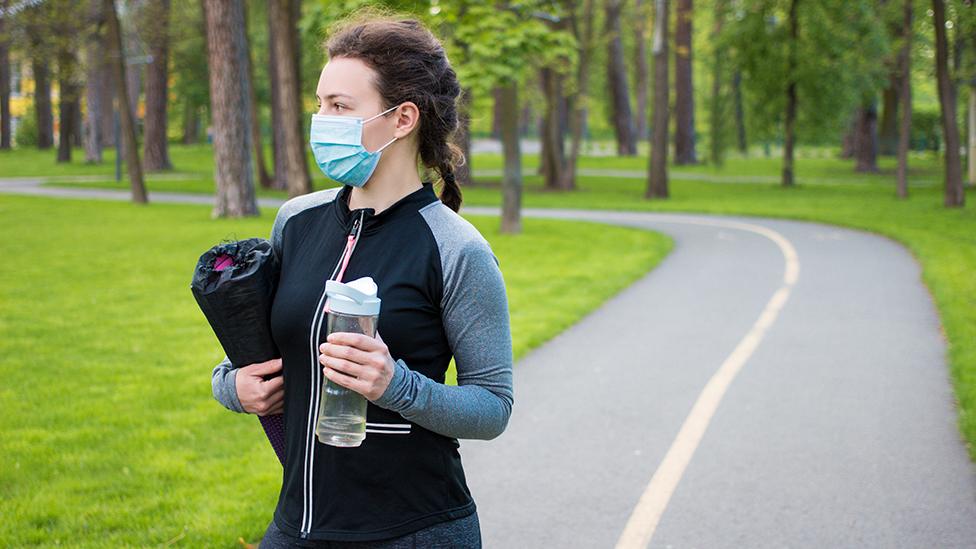Covid fines: Looking back on a year of pandemic rule-breaking
- Published
A large group of people were filmed in January holding a snowball fight in Leeds
From Dracula fans making a detour for a glimpse of a ruined abbey to bird watchers chasing a rare sighting, thousands of Covid fines have been issued since the pandemic began.
Formerly everyday activities such as throwing a party, meeting friends indoors or travelling to other towns for food have all been the subject of Fixed Penalty Notices (FPNs) at times since March 2020.
While the vast majority of people have complied with the rules, inevitably there have been people who broke them.
In all, almost 70,000 FPNs were issued in England and Wales up to 14 February 2021, according to the National Police Chiefs Council.
Here we take a look at just a few examples of rule-breaking which have landed the people involved with a penalty.
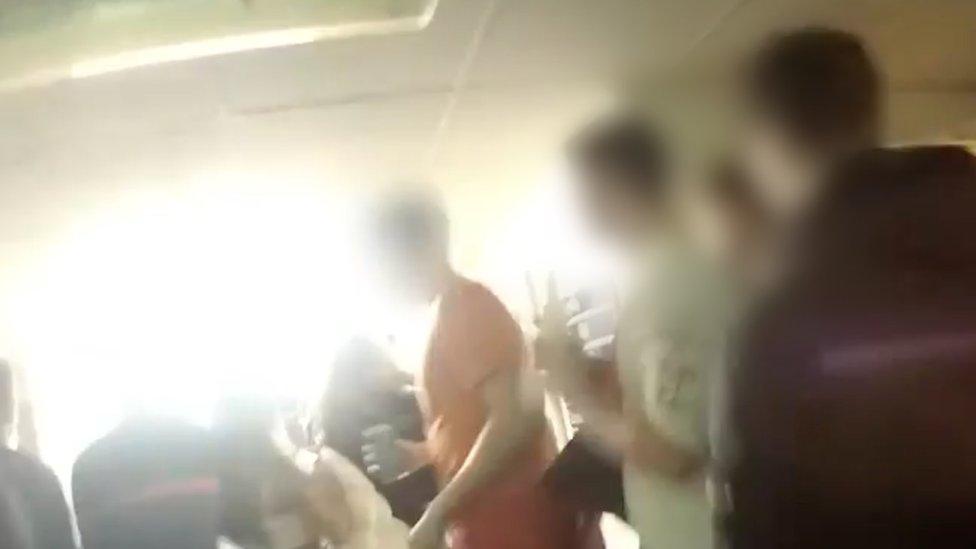
South Yorkshire Police said they were appalled to see "such blatant disregard" after discovering 150 students at a party
Student events have made the headlines for all the wrong reasons over the last 12 months.
A party in Sheffield proved costly to the organisers, when police found more than 150 students gathered at Ranmoor Student Village.
Though some fled the scene, organisers and attendees were left facing fines totalling up to £34,000.
A student at Bournemouth University found himself with a £10,000 fine after ignoring repeated warnings not to host a series of events in his student accommodation.
Meanwhile, four university students in Nottingham were fined £10,000 each after telling police who broke up their house party they were "spoiling their fun".
Many of those attending attempted to hide as officers arrived.
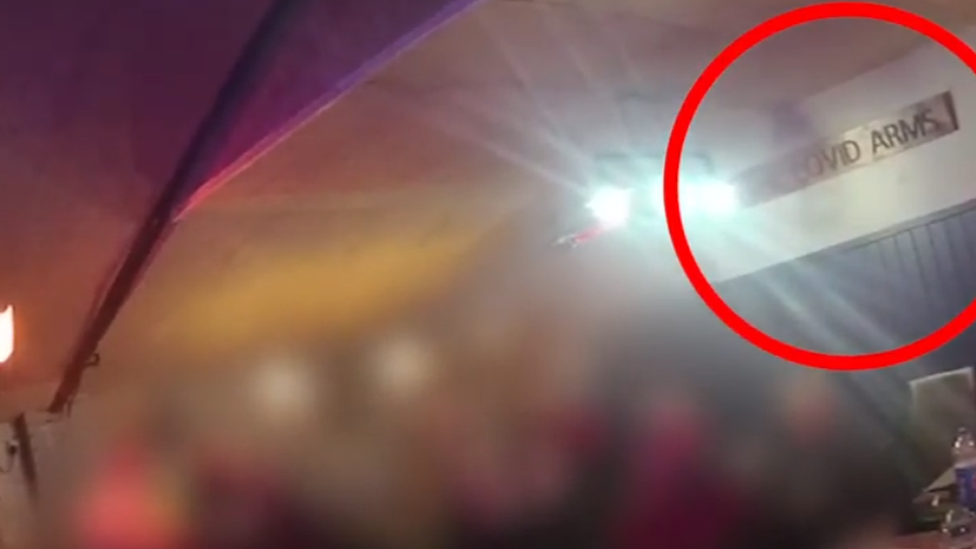
Thirteen people were found inside the makeshift "Covid Arms" - a workshop in Dudley Port
It was not just students who faced fines for mass gatherings.
In March 2021, Northamptonshire Police handed out fines after about 200 fans gathered in Corby to celebrate Glasgow Rangers winning the Scottish Premiership.
Meanwhile, in Cheshire, 15 partygoers in Alderley Edge were fined in February after being found hiding in cupboards when officers raided an organised event.
West Midlands Police also fined 15 people after a call-out to a makeshift club in Birmingham, complete with DJ, bar and VIP area.
The same night, the force raided a workshop transformed into a bar nicknamed "The Covid Arms".
Winter weather proved expensive for two men from Leeds. They were each fined £10,000 for organising a mass snowball fight in January.
Before lockdowns, a day out at the coast was a popular trip away for many but over the past year it has proved costly for some visitors.

Whitby Abbey is a popular destination among fans of Bram Stoker's Dracula
In March 2021, two Dracula fans were given fixed penalty notices after visiting Whitby in North Yorkshire to pay homage to their fictional hero.
The town's abbey features in Bram Stoker's 1897 gothic horror novel and Dracula's first victim was in the resort.
According to North Yorkshire Police, the pair were on a 350-mile trip from Edinburgh to Cambridge when they decided to take a detour.
North Yorkshire Police also issued fines to 11 people who had travelled from Manchester to visit the abbey.
Other visitors to Whitby had different reasons for disobeying the rules, with one couple who made a 135-mile round trip telling police they had come "to smell the sea".
In Devon, five bird watchers were handed penalty notices after travelling from outside the area to catch a glimpse of a rare bird.
The northern mockingbird, not often seen in the UK, was first spotted in a garden in Exmouth and a tweet about the sighting prompted great excitement among twitchers who flocked to the area in breach of guidelines.
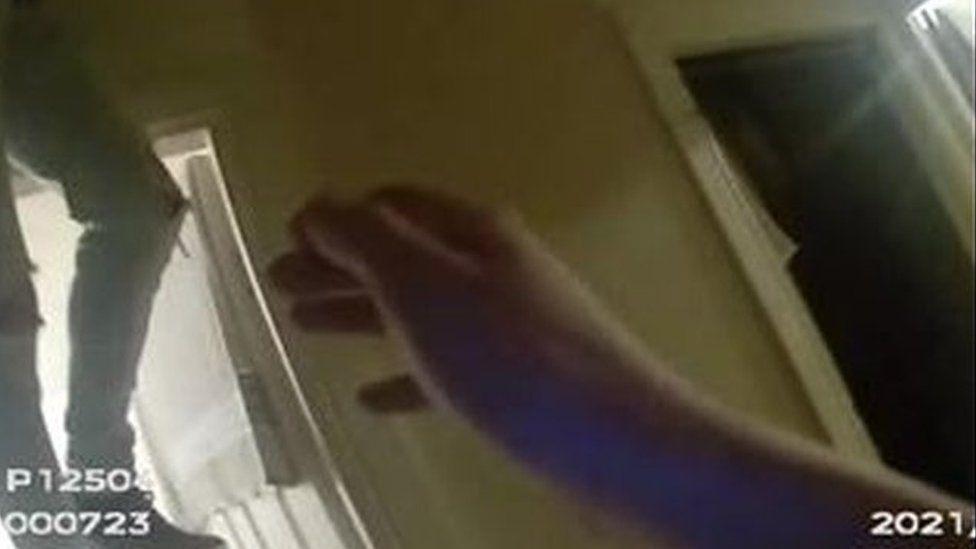
Some people went to great lengths to escape being caught at an illegal gathering such as this man in Scarborough who climbed into the loft
A family from Middlesex who made a 500-mile round trip to the Lake District in April 2020 told police it was acceptable if they wore masks and gloves.
The same month, a family from London drove 200 miles to go fishing in Devon. Their only catch was a lockdown fine.
With diners being unable to sit in restaurants, tucking in to a takeaway at home became the new going out - but, for some, the lure of travelling for a meal was too much.
One man was fined £200 after driving 100 miles from Luton to Devizes for a McDonalds - the town does not have a branch of the chain.
But it wasn't all fast food as one couple who decided on a 130-mile trip to York from Derbyshire for a takeaway roast dinner found out to their cost.
Weddings are usually a time of celebration, but large receptions are not permitted, external under Covid-19 rules.
About 150 people were caught at a reception in Stamford Hill, north London, in January, though guests fled the scene as police arrived.
In Blackburn, police broke up a reception of more than 100 in August, while a landowner near Leeds was issued with a £10,000 fine for hosting a wedding party estimated to have up to 300 people celebrating the happy couple in September.

Jessica Allen and Eliza Moore were fined for travelling five miles to Foremark Reservoir in Derbyshire
The issue of travelling for exercise was highlighted in January when two women were each fined £200 after driving five miles from home to take a walk.
Jessica Allen and Eliza Moore were walking at Foremark Reservoir, Derbyshire, when they were "surrounded" by officers.
At the time, Derbyshire Police insisted driving to exercise was "not in the spirit" of the most recent lockdown.
However, the force later quashed the fines and apologised to the women after new national guidance was issued.
The chair of the National Police Chiefs Council, Martin Hewitt, said it had been "frustrating" a small number of people continued to defy the regulations with no regard to their own or other people's safety.
"Officers are not getting into a debate or discussion with these people about what the rules are or whether they are necessary.
"We're taking a common sense approach, applying discretion and judgement when engaging with the public.
"But common sense would dictate that someone having a party is well aware what they are doing is wrong and has made an informed decision to do it anyway."
- Published1 July 2022

- Published26 January 2022

- Published28 January 2021
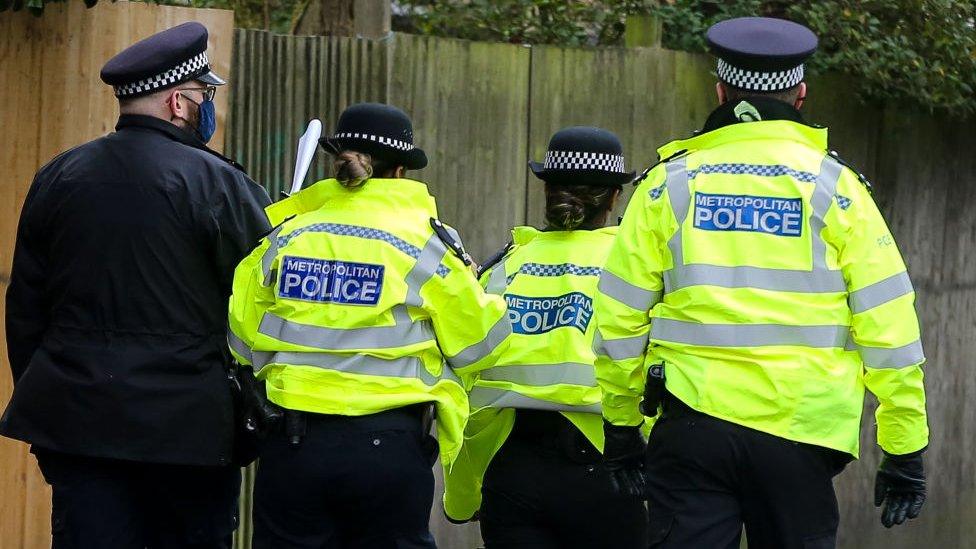
- Published12 January 2021
